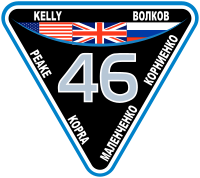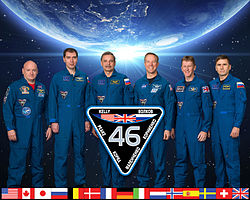Expedition 46
| Expedition 46 | |||
 | |||
| Uppdragsstatistik | |||
|---|---|---|---|
| Rymdstation: | ISS | ||
| Start: | 11 december 2015[1] | ||
| Slut: | 1 mars 2016[1] | ||
| Antal besättningsmedlemmar: | 6 st | ||
| Rymdpromenad | |||
| Antal rymdpromenader: | 3 st | ||
| Total tid: | 9 timmar, 44 minuter | ||
| Transport | |||
| Uppskjutning: | med Sojuz TMA-16M, Sojuz TMA-18M, Sojuz TMA-19M | ||
| Uppskjutningsplats: | Kosmodromen i Bajkonur | ||
| Landning: | med Sojuz TMA-18M, Sojuz TMA-19M | ||
| Landningsplats: | Kazakstan | ||
| Kronologi | |||
| |||

Expedition 46 var den 46:e expeditionen till Internationella rymdstationen (ISS). Expeditionen började den 11 december 2015 då delar av Expedition 45s besättning återvände till jorden med Sojuz TMA-17M.
Jurij Malentjenko, Timothy Peake och Timothy Kopra anlände till stationen med Sojuz TMA-19M den 15 december 2015.
Expeditionen avslutades den 1 mars 2016 då Scott J. Kelly, Michail Kornijenko och Sergej Volkov återvände till jorden med Sojuz TMA-18M.
Expedition 46 var sista etappen i Michail Kornijenkos och Scott J. Kellys ett år långa vistelse ombord på rymdstationen.
Besättning
| Position | Första delen (11 - 15 december 2015) | Andra delen (15 december 2015 - 1 mars 2016) |
|---|---|---|
| Befälhavare | Hans fjärde rymdfärd | |
| Flygingenjör 1 | Hans andra rymdfärd | |
| Flygingenjör 2 | Hans tredje rymdfärd | |
| Flygingenjör 3 | Hans tredje rymdfärd | |
| Flygingenjör 4 | Hans första rymdfärd | |
| Flygingenjör 5 | Hans andra rymdfärd | |
Referenser
- ^ [a b] NASA's Space Station Expedition 46, läst 3 september 2016.
Externa länkar
| |||||||||||||||||||
Media som används på denna webbplats
ISS Expedition 47 Insignia
- The central depiction of the International Space Station (ISS) is in recognition of the international achievement of designing, building and maintaining a world-class space laboratory. The orientation of the ISS represents the view seen by the Soyuz crewmembers as they approach the station. The blackness of space in the background portrays the limitless area that humankind has yet to explore.
- The efforts of the Expedition 47 crew will contribute to the growing body of knowledge and expertise that will allow us to extend human exploration beyond low-Earth orbit. The three blue colors are from the flags of the Expedition 47 crew’s home countries (United States, Russia and the United Kingdom), representing a fundamental commonality among each of the international partner countries whom the crewmembers serve.
The 46 icon in the foreground of the Expedition 46 patch represents the forty-sixth expeditionary mission to the International Space Station. The graphic portrays the limb of the home planet, Earth, with the black vastness of space in the background. Earth is depicted at the top with the flags of the countries of origin of the crew members: the United States of America, Russia and the United Kingdom. The flag of the U.K. is displayed in a position of prominence in recognition of the significance of the first British astronaut flown in space for the European Space Agency. The outer border is in the shape of a triangle with an unbroken border, symbolizing the infinite journey of discovery for past, present and future space explorers. The names of the six Expedition 46 astronauts and cosmonauts are shown in the border.
The Expedition 45 crew will conduct its journey of exploration and discovery from a summit whose foundation was built by past generations of pioneers, scientists, engineers and explorers. This foundation is represented by the book of knowledge at the bottom of the patch. Curves radiate from the book representing the flow of knowledge - and the hard work, sacrifice and innovation that makes human spaceflight possible. The pages written during Expedition 45 will serve to benefit humanity on Earth and in space. The International Space Station is represented by a single bright star soaring over the Earth, illuminating a path to future, more distant destinations.
Expedition 46 crew portrait with (from left) Commander Scott Kelly and Flight Engineers Sergey Volkov, Mikhail Kornienko, Timothy Kopra, Timothy Peake and Yuri Malenchenko.






